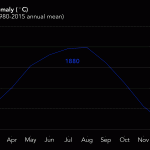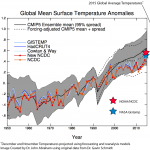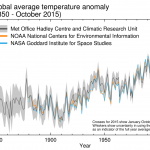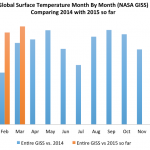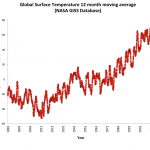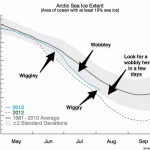Warmest Year
The year 2016 was messy and expensive and full of climate change enhanced weather disasters. There were, according to Jeff Masters and Bob Henson, over 30 billion dollar disasters last year.
This is the fourth-largest number on record going back to 1990, said insurance broker Aon Benfield in their Annual Global Climate and Catastrophe Report issued January 17 (updated January 23 to include a 31st billion-dollar disaster, the Gatlinburg, Tennessee fire.) The average from 1990 - 2016 was 22 billion-dollar weather disasters; the highest number since 1990 was 41, in 2013.
The frequency of…
The year that just finished, 2015, was the warmest year recorded in the instrumental record. The actual data for December is not officially available yet, but my friend and colleague John Abraham keeps track of the global surface temperature daily and has done an amazing job at estimating the final temperature anomaly value that is eventually reported in each of several databases. He has provided a graph using his estimated value, above.
There are two major contributing factors, maybe three depending on how you count everything, to 2015 being the warmest year. The main factor is, of course…
The World Meteorological Organization has announced that they expect 2015 to be the warmest year on record, and that we are in the warmest five year period on record. We are speaking here of global surface temperatures, though similar descriptions probably apply to the upper 2000 meters or so of the ocean as well.
The global average surface temperature in 2015 is likely to be the warmest on record and to reach the symbolic and significant milestone of 1° Celsius above the pre-industrial era. This is due to a combination of a strong El Niño and human-induced global warming, according to the…
That is a good question, and difficult to answer. If it turns out to be, it will be the warmest calendar year in the instrumental record, which goes back into the 19th century.
Regardless of what El Nino (ENSO) does, 2015 will be a warm year. Why? Because everything is warm and getting warmer and even if 2015 is less warm than 2014, it will be warm. There is no other possibility.
Even without the effects of El Nino, though, it is possible that 2015 will be warmer than 2014 because we see a lot of heat out there. If the present, relatively weak El Nino continues for a while, it will likely…
A year is 12 months long. It is also the period of time between January and December, inclusively. But you can use that first definition (we do it all the time) when appropriate. So, we can ask the question, how does the last 12 months, ending at the end of January 2015, compare to previous 12 month time periods in terms of global surface temperature?
We can do this using a moving average. A moving average for a series of values is the average of a certain number of values in sequence, calculated to correspond to each value. So a one year (12 month) moving average of temperature would be…
Large ponderous entities like the IPCC or government agencies like NOAA take forever to make basic statements about climate change, for a variety of reasons. They are going to have to speed up their process or risk losing some relevance. Among the coming problems we anticipate with global warming will be events that have huge, widespread effects and that happen in time scales of weeks or months, or a season, and having a nice governmental report about it two years later isn't going to do anybody any good. So let's see to that problem, please (looking sternly at IPCC and NOAA).
But that's…
